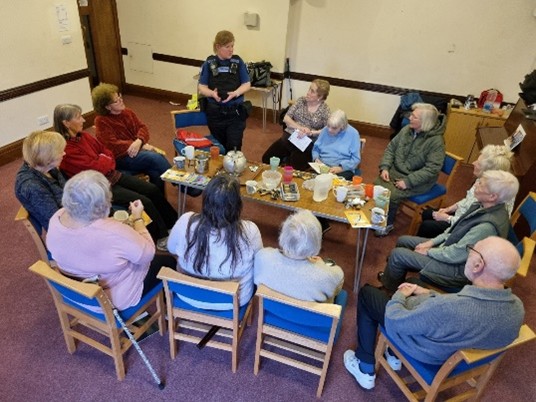February is often thought of as a quiet time of year. The festive period is well and truly over and the weather can be a little on the gloomy side. The “Time to Talk” campaign, run by ‘Mind’, ‘Rethink Mental Illness’ (England) and ‘The Co-Op’, encourages people to talk openly about their mental health and reduces the stigma behind it. As the winter months can make people feel more isolated, it’s a perfect time to focus on these issues and start important conversations.
Why Talking About Mental Health Matters
Difficulties with mental health affect a large number of people. The World Health Organization says that 1 in 4 people worldwide will experience mental health issues at some point in their lives. However, many don’t talk about it because they are afraid of being judged or misunderstood. However, it’s proven that talking about mental health issues and seeking help really can make huge impact.
This is where “Time to Talk” helps. The campaign encourages people to have open discussions about mental health. Talking openly helps reduce the stigma and makes it easier for those struggling to ask for help. Having a conversation about mental health can be the first step to feeling better and getting help where needed.
How Social Isolation Affects Mental Health
Social isolation is a major problem for many people, especially in the winter months. The cold weather and shorter days often mean people stay inside more, leading to less social interaction. For some, this can lead to feelings of loneliness, anxiety, depression and can even create problems with memory as people age!
Social isolation affects all ages but is especially tough on people who live alone, those with long-term health problems, the older generation who don’t tend to get out and about as much and younger people who may struggle with fitting in or bullying.
When someone feels isolated, it can be hard to reach out to others for help, which makes things worse. Over time isolation can even begin to affect physical health, reducing our opportunities to be physically active.
How to fight social isolation for yourself
While it can feel hard to overcome social isolation, there are simple things you can do to feel more connected. Here are some ways to help:
- Reach Out to Others The first step is often just reaching out to someone you trust, whether it’s a friend, family member, co-worker. A phone call, text message, or video chat can help you feel more connected.
- Join a club or group If you don’t have people nearby, consider joining community groups or online forums where you can meet new people. Volunteering is also a great way to make connections. Our Falls Prevention course is perfect for supporting older people and those who have difficulty with balance both physically and mentally. Our fully trained instructors work with clients on their mobility, strength and balance, before sitting down for a cup of tea and a chat.

- Start Small and Be Consistent You don’t need to make big changes all at once. Small, regular efforts can help. You could try having a coffee date with a friend every week, joining a club, or taking a walk with someone. The key is consistency—keeping in touch regularly helps you feel less isolated.
- Take Care of Your Mental Health Talking about your feelings and doing things that help you relax are good for your mental health. You could consider therapy or counselling to get extra support. Simple practices like deep breathing, yoga, or writing in a journal can also help reduce stress.
- Use Technology to Connect Technology can be a helpful tool when trying to stay connected. Video calls, messaging, and social media make it easier to keep in touch, even if you can’t meet in person. Online support groups or apps for mental health are also available for those who need extra help.
- Create a Daily Routine Having a routine can help bring structure to your day. Whether it’s setting regular times for meals, exercise, or hobbies, having a plan can make you feel more in control and less isolated.
- Get Professional Help There are plenty of supports available to help alleviate feelings of social isolation. From counselling to befriender services, there are lots of options available.
Supporting others around you
Not everyone will feel the need or the inclination to approach professional services, but may still be experiencing the effects of social isolation or mental health issues. Something as simple as saying “Good Morning” and a smile when passing someone in the street could brighten their day.
Check in on those near and dear to you and ask how they are doing – it can make a big difference! “Time to Talk” encourages everyone to be active listeners, offer support, and have these important conversations. Active listening is more than just hearing someone’s words and offering a reply. It’s about taking those word in and making sure you truly understand the meaning behind them.
February is the perfect time to start these conversations. It’s not about doing something huge—it’s about showing you care. Just being willing to listen and talk about mental health helps create an environment where people feel supported and less alone.
Local supports in Cambridgeshire and Peterborough
There are lots of organisations available to help with mental health issues and social isolation. Here are some of our local supports:
- Mind – Mental Health support
- Andy’s Man Cub – Men’s mental health support
- The Samaritans – Talking support
- Healthy You Services – Including Mental Health Trainers (8 1:1 sessions providing support and advice to achieve health goals alongside a diagnoses of a mental health illness), Falls Prevention and Physical Activity services
- Cruse Bereavement Service
- Age Concern – Befriending services and social clubs and groups
- Visit your GP surgery to discuss mental health
- Psychological Wellbeing service provided by CPFT – For common mental health problems
- Keep Your Head – Helplines and suicide prevention support
- NHS 111 Option 2 – For use in a mental health crisis situation
It’s Time to talk, so lets support each other this February.



